Papers by Robert González García

Revista de Estudios de Género, La Ventana, 2023
La pandemia del COVID-19 y, en particular, las medidas de mitigación tomadas por las institucione... more La pandemia del COVID-19 y, en particular, las medidas de mitigación tomadas por las instituciones gubernamentales en México, tales como el cierre de todas las escuelas de todos los niveles educativos, han traído fuertes consecuencias regresivas tanto en términos educativos como de igualdad de género. En el presente artículo partimos de un marco teórico de género y familia para analizar, junto con las repercusiones negativas de esta medida, especialmente para mujeres y niños/as, experiencias de crianza y educación comunitarias que surgen en México para intentar preservar derechos educativos y laborales vulnerados por el cierre escolar, tales como la sociabilidad, la guardia y custodia de los menores, el derecho a una vida libre de violencia, la conciliación laboral y familiar, entre otros. A través de la auto-etnografía de una pequeña experiencia de resistencia al aislamiento de la infancia impuesto por las autoridades educativas en México, se pretende proponer algunas claves para una salida eco-feminista y comunitaria a la crisis de la educación en este país.
Acciones colectivas juveniles durante la pandemia
Observatorio en Infancias y Juventudes, 2021
Acciones colectivas juveniles durante la pandemia : un estudio comparado sobre repertorios de acc... more Acciones colectivas juveniles durante la pandemia : un estudio comparado sobre repertorios de acción, formas de organización interna y representaciones sobre la política : Argentina. Autores: Melina Vázquez, René Unda Lara, Jorge Benedicto, Alejandro Cozachcow, Olivia Cristina Pérez, Elisa Guaraná de Castro, Marisa Revilla Blanco, Robert González García, Sergio Pacheco, Julián Castañeda, Marcos Mutuverría, María Virginia Nessi, María Martínez, Camila Ponce Lara, Felipe Cárcamo, Juan Antonio Taguenca Belmonte y Yadira Palenzuela Fundora.
Libros resenados: Rodriguez Garcia, Arturo El regreso autoritario del PRI: Inventario de una naci... more Libros resenados: Rodriguez Garcia, Arturo El regreso autoritario del PRI: Inventario de una nacion en crisis Grijalbo, 2015 381 pags. Villoro, Luis La alternativa: Perspectivas y posibilidades de cambio Fondo de Cultura Economica, 2015 142 pags.
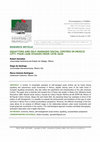
PArtecipazione e COnflitto , 2020
A number of remarkable examples of self-managed social centres can be found among squatting and a... more A number of remarkable examples of self-managed social centres can be found among squatting and autonomous social movements in Mexico; despite sharing some of the traits found in European squatting movements, they also reflect the specificities and characteristics of the Latin American context. This paper aims to describe and compare four of these case studies in Mexico City: Biblioteca Social Reconstruir (BSR, Rebuild Social Library), Escuela de Cultura Popular Mártires del 68 (ECPM 68, Martyrs of 68 Popular Culture School), Okupa Che and Chanti Ollin. By examining these four examples in terms of the politics of self-management, it is possible to evaluate the achievements and limitations of this type of urban commons in Mexico from a critical success/failure perspective. Moreover, the different chronology of the four cases allows for an analysis of different stages in the relationship between urban social movements and broad grassroots movements in the country. The methodological approach includes committed ethnography, participant observation and in-depth interviews.

Menelique, Magazine radicale internationale, 2020
The intention of this paper is to describe four experiences of Self-managed Social Centres in Mex... more The intention of this paper is to describe four experiences of Self-managed Social Centres in Mexico City: the Biblioteca Social Reconstruir, Chanti Ollin, Okupa Che and the Escuela de Cultura Popular Mártires del 68. The description of these experiences with the politics of self-management allows us to make an evaluation of the achievements of this kind of urban activism in Mexico. We can analyze the experiences of these Self-managed Social Centers (SSC) in Mexico City, as a response from the common needs that the neoliberal city has not met, such as those of alternative sociability and housing. The political recognition that common goods are produced and used for social benefit becomes a framework to resist capitalist power, pillage, and dispossession. Popular self-organization in the SSC is a way to recover the policy, kidnapped by the interests of capital, to carry out an anti-capitalist transition.
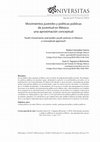
En los últimos años emergen en México nuevas formas de participación política juvenil. Sin embarg... more En los últimos años emergen en México nuevas formas de participación política juvenil. Sin embargo, las políticas públicas de juventud siguen abordando la atención a las problemáticas juveniles sin su participación y de forma deficitaria. El objetivo del artículo es trazar un marco conceptual que permita pensar unas políticas públicas de juventud desde y para los mismos jóvenes mexicanos. La metodología
es el análisis documental y la hermenéutica de los procesos sociales que protagonizan los jóvenes mexicanos en los ámbitos de la participación política en los últimos años, entrecruzándolo con el análisis de la respuesta de las administraciones en forma de políticas de juventud. Los resultados evidencian la emergencia de una juventud más participativa que, sin embargo, muestra más continuidades que cambios
en términos de cultura política y que convive con la persistencia de políticas públicas juveniles propias de periodos anteriores. La conclusión es que caminar hacia unas políticas públicas juveniles participativas es un objetivo importante para la democratización y mayor eficiencia de la atención a los jóvenes.
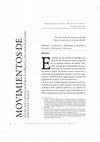
Revista Especializada en investigación jurídica (REIJ), 2019
Both literature on social movements and public policies have neglected the study of the effects o... more Both literature on social movements and public policies have neglected the study of the effects of social movements on policies. This article aims at identifying the impacts of the squatting movement on local policies in Spain in a historical perspective (1984-2018). Through the hermeneutics of social processes, three cases are compared (Madrid, Barcelona and Bilbao). Descriptive quantitative and qualitative data of the following variables are analyzed: 1) history, types, number and visibility of squatters; 2) changes in local governments and 3) institutionalization of the movement (types of relationships with administrations). The result of the research is that the squatting movement has an impact on decision making processes, through innovations and creativity, which materialize in new houses, as well as cultural, social or youth policies. This phenomenon is rooted in urban conflicts over which this group deliberately or indirectly exerts pressure as a side effect of a disruptive action. The experiences of squatting are different in the three cities: there are changes and continuities during the studied period and diversity in the level of institutionalization and in the movement-authorities relations.
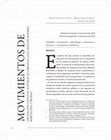
Revista Especializada en Investigación Jurídica, 2019
The objective of the article is to identify the impacts of the squatting movement on public polic... more The objective of the article is to identify the impacts of the squatting movement on public policies in Spain (1984-2018). Through the hermeneutics of social processes, three cases are compared (Barcelona, Madrid and Bilbao). Qualitative and quantitative data of the following variables are analyzed: 1) history, types, number and visibility of squatting 2) changes in local governments and 3) institutionalization.
This is an original study: the impacts of social movements do not usually appear in the academic production of public policies and experts in social movements have rarely been interested in the specific effects of collective action on policies.
The result of the research is that the squat movement affects decision-makers, through innovations and creativity, which materialize in new housing, cultural, social or youth policies. This phenomenon is rooted in urban conflicts, over which the squat movement deliberately or indirectly exerts pressure as a collateral effect of a disruptive action. The squatting experiences are different in the three cities, there are changes and continuities during the period studied and diversity in the level of institutionalization and in the relations between movement and authorities.
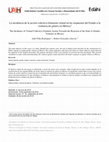
Edähi Boletín Científico de Ciencias Sociales y Humanidades del ICSHu, 2018
The main objective of this essay is to study, through four concrete cases, the role... more The main objective of this essay is to study, through four concrete cases, the role of digital social networks for the construction of a Public Agenda to combat gender violence in Mexico. The central argument is that these new forms of virtual collective action innovate the repertoire of the feminist movement. The general conclusion is that a new feminist 2.0 activism has been developed. This activism contributes to make visible and denaturalize the violence against women and affects the State's responses to gender violence in Mexico.Keywords:Social networks, gender violence, feminism, social movements, Femicide
Resumen:El objetivo central de este ensayo es reflexionar, a través de cuatro casos concretos, sobre el papel de las redes sociales digitales en la construcción de una Agenda Pública de lucha contra la violencia de género en México. El argumento central radica en que estasnuevas formas de acción colectiva virtual innovan el repertorio del movimiento feminista. La conclusión general es que se ha desarrollado un nuevo activismo feminista 2.0, que contribuye a visibilizar y desnaturalizar la violencia contra las mujeres e inciden en lasrespuestas del Estado hacía de la violencia de género en México.Palabras Clave: Redes sociales. violencia de género. Feminismo. movimientos sociales.
Algunas visiones del proceso hacia la independencia que está viviendo Catalunya, atribuyen el mis... more Algunas visiones del proceso hacia la independencia que está viviendo Catalunya, atribuyen el mismo a unas supuestas élites etnicistas que están engañando a la ciudadanía catalana. Pero un examen minucioso de lo sucedido en los últimos 15 años, nos debela justamente lo contrario. Sin el vigor y la densidad de una sociedad civil como la catalana sería difícil explicar tanto la pervivencia de la identidad, la lengua y la cultura catalanas, como su actual lucha por la República y la democracia. En este artículo intentaré dar unas pinceladas sobre el papel de la sociedad civil catalana en el proceso independentista. El artículo explicará de forma cronológica el papel de las organizaciones civiles en la lucha por la autodeterminación primero, la independencia después, y finalmente, la construcción de una República Catalana.
Estudios Políticos, 2018
In the present article de authors examined the internal life of the three main political parties ... more In the present article de authors examined the internal life of the three main political parties of the State of Hidalgo, according to the obtained electoral results, pri, pan and prd between 1988 and 2016. In this period the pri has remained a predominant party, although not already hegemonic.
Its ruptures have allowed the opposition to gain ground, especially at the municipal level. The pan and the prd have not consolidated a strong party structure able to face the priat the state level, having great and lasting disagreements; as well as internal conflicts derived from the election of candidates to the representation posts and to the local party leadership.

Movimientos. Revista Mexicana de Estudios de los Movimientos Sociales, 2018
Building on the theoretical approximations of sociopolitical transnationalism and the study of et... more Building on the theoretical approximations of sociopolitical transnationalism and the study of ethnic associationism, this article examines activism among the new wave of Catalan migrants to Mexico as a result of the 2008 economic crisis. The research is an activist effort evolves quantitative and qualitative methodology: online and in-person questionnaire directed towards participants active in social networks and Catalan associations in Mexico, participant observation, in-depth interviews, in order to demonstrate distinct participatory profiles.
The results signal the emergence of a new ethnic virtual associationism, the need to revise traditional ethnic associations, and a new socio-economic and political profile among Catalan migrants to Mexico as more socially pluralistic and heightened political orientation towards a transversal independence movement.
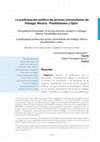
Ánfora, Jun 27, 2018
Objective: to describe preference of democracy, political participation, information, interest, a... more Objective: to describe preference of democracy, political participation, information, interest, and observance of the majority’s decisions whilst associating them with age and education level. Furthermore, this study aims to typify the political participation of young university students in the Hidalgo State, Mexico and identify their confidence in democratic institutions. Methodology: this documental research on the sociopolitical context in Hidalgo used a mixed method approach with a citizenship survey, representative participation of Hidalgo, interviews and focal groups were applied as well. Results: a preference for democracy was revealed, independent of age, gender, education level and income; moreover, the results found a disinformation, disinterest and little political participation, as well as a distrust in the democratic authorities and little observation of the majority’s decisions. The young university students from Hidalgo who do not participate politically, have a discourse which is based on fear; those who participate conventionally posses a discourse founded in realism that defends the impact of the political agenda in society; and those who participate in non-conventional ways maintain a discourse of politicization defined in the lack of confidence in the existing mechanisms of conventional participation. Conclusions: the university students of Hidalgo are placed in a socio-political and adverse context as regards to political
participation. They express themselves through three types of political participation: non-participants (experiential with low participation), conventional participation (realistic with participation in political parties), and non-conventional (politicized with participation in social movements).
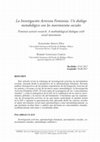
Empiria. Revista de Metodología de Ciencias Sociales, Sep 20, 2017
This article reviews the activist research strategy in social movements,
thought from the perspec... more This article reviews the activist research strategy in social movements,
thought from the perspective of feminist epistemology. It presents retrospective analyzes of the authors’ own Activist Research experiences and puts them in the light of a new methodological framework: Feminist Activist Research (FAR).
The paper starts from the proposal of the «situated knowledge» and places the emergence of the FAR at the confluence of the new global movements and the third wave of feminism. We conclude that the activist research experiences in which we have participated can be included in the FAR and suppose the most adequate approach from the social sciences to the subject social movement both epistemologically and methodologically, since they allow us to collect data and
analysis that become as situated knowledge, academically relevant and socially useful.
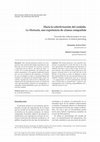
Hacia la colectivización del cuidado. La Mainada, una experiencia de crianza compartida, Dec 31, 2016
Este artículo pretende analizar un componente muy puntual del trabajo reproductivo que tiene que ... more Este artículo pretende analizar un componente muy puntual del trabajo reproductivo que tiene que ver con el cuidado. En concreto, la crianza
y educación de los niños y las niñas de entre 1 y 6 años. En el actual panorama, las soluciones que suelen proponerse a los agentes implicados tienen que ver con el papel de las empresas o el Estado
en aras de delegar en ellas la responsabilidad del cuidado y la educación de nuestros hijos e hijas. En cambio, experiencias como la de La Mainada -una organización de participación social y el estudio de
caso aquí presentado- apuntan a la autogestión y a compartir responsabilidades para una colectivización del cuidado.
Palabras clave: bien común, cooperativismo, cuidado,
economía feminista.
Abstract. This article analyzes a very specific component
of reproductive work that has to do with care. Specifically, the upbringing and education of children between 1 and 6 years of age. In the current
scenario, the solutions often proposed to the players involved have to do with the role of the Market or the State in order to delegate to them
the responsibility for the care and education of our children. Instead, experiences such as La Mainada – an organization of social participation and the case of study that we present here – point to selfmanagement and to sharing responsibilities for a collectivization of care.
Squatting movement appears in Spain in the 80's. The year 2006 emerges a new and differentiated s... more Squatting movement appears in Spain in the 80's. The year 2006 emerges a new and differentiated social movement, the housing movement. This movement organized young people of all over the country, and therefore consolidated hundreds of platforms of affected by the mortgages of different ages. Their proposals and demands have been a rate routing coming from the 15-M movement. The aim of this article is to compare these two urban movements that could be also understood as emancipation practices and new shapes of participation of the civil society.
El movimiento magisterial y las resistencias al neoliberalismo, Jun 24, 2016
Artículo de difusión que resume las causas, los hechos y las perpectivas del movimiento magisteri... more Artículo de difusión que resume las causas, los hechos y las perpectivas del movimiento magisterial mexicano en lucha contra la reforma educativa de corte neoliberal en 2016.

This article deals with the mingling of the feminist movement and the Okupación (squatters) movem... more This article deals with the mingling of the feminist movement and the Okupación (squatters) movement in Spain. The authors analyze the case of Eskalera Karakola, the most emblematic, long-standing feminist occupation in Spain. To do that, they did two in-depth interviews with key activists, and based on that, lay out feminism’s(s’) current debates and the reciprocal implications they have with the practice of okupación.
They conclude that this collective displays the traits of third-wave feminism, seeking the sustainability of life and caring. These, together with the thirst for autonomy, are some of the convergences with the Okupa Movement.
KEY WORDS: gender, okupación, squatters, feminism, social movements, feminist economy, Eskalera Karakola.
RESUMEN
Este artículo aborda el entrecruzamiento del movimiento feminista y el movimiento por la okupación. Analizamos el caso de la Eskalera Karakola, la okupación feminista más emblemática y duradera en España. Para ello, realizamos dos entrevistas a profundidad a militantes clave. A partir de ahí, planteamos los debates actuales del (o los) feminismo(s) y las implicaciones recíprocas con la práctica de la okupación. Concluimos que este colectivo tiene los rasgos del feminismo de la tercera ola y apuesta por la sostenibilidad de la vida y el cuidado. Estas son algunas confluencias con el movimiento okupa, así como el anhelo de autonomía.
PALABRAS CLAVE: género, okupación, feminismo, movimientos sociales, economía feminista, Eskalera Karakola.
The practical of squatting that arrived to our country in the 80's is considered a social movemen... more The practical of squatting that arrived to our country in the 80's is considered a social movement by multiple authors (Calle, 2004; Pruijt, 2004; Martínez, 2002). The year 2006 appears a new and differentiated social movement, the housing movement. This movement organized young people of all over the country, and therefore consolidated hundreds of platforms of affected by the mortgages of different ages. Their proposals and demands have been a rate routing coming from the 15-M movement. The aim of this article is to compare these two urban movements that could be also understood as emancipation practices and new shapes of participation of the civil society.
Key words: youth, squatting, housing, crisis, social movements
Reseña publicada en la revista Afers Internacionals de dos libros:
-Rodríguez, Arturo. El regres... more Reseña publicada en la revista Afers Internacionals de dos libros:
-Rodríguez, Arturo. El regreso autoritario del PRI. Inventario de una nación en crisis. Grijalbo, 2015, 381 págs.
-Villoro, Luis. La alternativa. Perspectivas y posibilidades de cambio. Fondo de Cultura Económica, 2015, 142, págs.











Uploads
Papers by Robert González García
es el análisis documental y la hermenéutica de los procesos sociales que protagonizan los jóvenes mexicanos en los ámbitos de la participación política en los últimos años, entrecruzándolo con el análisis de la respuesta de las administraciones en forma de políticas de juventud. Los resultados evidencian la emergencia de una juventud más participativa que, sin embargo, muestra más continuidades que cambios
en términos de cultura política y que convive con la persistencia de políticas públicas juveniles propias de periodos anteriores. La conclusión es que caminar hacia unas políticas públicas juveniles participativas es un objetivo importante para la democratización y mayor eficiencia de la atención a los jóvenes.
This is an original study: the impacts of social movements do not usually appear in the academic production of public policies and experts in social movements have rarely been interested in the specific effects of collective action on policies.
The result of the research is that the squat movement affects decision-makers, through innovations and creativity, which materialize in new housing, cultural, social or youth policies. This phenomenon is rooted in urban conflicts, over which the squat movement deliberately or indirectly exerts pressure as a collateral effect of a disruptive action. The squatting experiences are different in the three cities, there are changes and continuities during the period studied and diversity in the level of institutionalization and in the relations between movement and authorities.
Resumen:El objetivo central de este ensayo es reflexionar, a través de cuatro casos concretos, sobre el papel de las redes sociales digitales en la construcción de una Agenda Pública de lucha contra la violencia de género en México. El argumento central radica en que estasnuevas formas de acción colectiva virtual innovan el repertorio del movimiento feminista. La conclusión general es que se ha desarrollado un nuevo activismo feminista 2.0, que contribuye a visibilizar y desnaturalizar la violencia contra las mujeres e inciden en lasrespuestas del Estado hacía de la violencia de género en México.Palabras Clave: Redes sociales. violencia de género. Feminismo. movimientos sociales.
Its ruptures have allowed the opposition to gain ground, especially at the municipal level. The pan and the prd have not consolidated a strong party structure able to face the priat the state level, having great and lasting disagreements; as well as internal conflicts derived from the election of candidates to the representation posts and to the local party leadership.
The results signal the emergence of a new ethnic virtual associationism, the need to revise traditional ethnic associations, and a new socio-economic and political profile among Catalan migrants to Mexico as more socially pluralistic and heightened political orientation towards a transversal independence movement.
participation. They express themselves through three types of political participation: non-participants (experiential with low participation), conventional participation (realistic with participation in political parties), and non-conventional (politicized with participation in social movements).
thought from the perspective of feminist epistemology. It presents retrospective analyzes of the authors’ own Activist Research experiences and puts them in the light of a new methodological framework: Feminist Activist Research (FAR).
The paper starts from the proposal of the «situated knowledge» and places the emergence of the FAR at the confluence of the new global movements and the third wave of feminism. We conclude that the activist research experiences in which we have participated can be included in the FAR and suppose the most adequate approach from the social sciences to the subject social movement both epistemologically and methodologically, since they allow us to collect data and
analysis that become as situated knowledge, academically relevant and socially useful.
y educación de los niños y las niñas de entre 1 y 6 años. En el actual panorama, las soluciones que suelen proponerse a los agentes implicados tienen que ver con el papel de las empresas o el Estado
en aras de delegar en ellas la responsabilidad del cuidado y la educación de nuestros hijos e hijas. En cambio, experiencias como la de La Mainada -una organización de participación social y el estudio de
caso aquí presentado- apuntan a la autogestión y a compartir responsabilidades para una colectivización del cuidado.
Palabras clave: bien común, cooperativismo, cuidado,
economía feminista.
Abstract. This article analyzes a very specific component
of reproductive work that has to do with care. Specifically, the upbringing and education of children between 1 and 6 years of age. In the current
scenario, the solutions often proposed to the players involved have to do with the role of the Market or the State in order to delegate to them
the responsibility for the care and education of our children. Instead, experiences such as La Mainada – an organization of social participation and the case of study that we present here – point to selfmanagement and to sharing responsibilities for a collectivization of care.
They conclude that this collective displays the traits of third-wave feminism, seeking the sustainability of life and caring. These, together with the thirst for autonomy, are some of the convergences with the Okupa Movement.
KEY WORDS: gender, okupación, squatters, feminism, social movements, feminist economy, Eskalera Karakola.
RESUMEN
Este artículo aborda el entrecruzamiento del movimiento feminista y el movimiento por la okupación. Analizamos el caso de la Eskalera Karakola, la okupación feminista más emblemática y duradera en España. Para ello, realizamos dos entrevistas a profundidad a militantes clave. A partir de ahí, planteamos los debates actuales del (o los) feminismo(s) y las implicaciones recíprocas con la práctica de la okupación. Concluimos que este colectivo tiene los rasgos del feminismo de la tercera ola y apuesta por la sostenibilidad de la vida y el cuidado. Estas son algunas confluencias con el movimiento okupa, así como el anhelo de autonomía.
PALABRAS CLAVE: género, okupación, feminismo, movimientos sociales, economía feminista, Eskalera Karakola.
Key words: youth, squatting, housing, crisis, social movements
-Rodríguez, Arturo. El regreso autoritario del PRI. Inventario de una nación en crisis. Grijalbo, 2015, 381 págs.
-Villoro, Luis. La alternativa. Perspectivas y posibilidades de cambio. Fondo de Cultura Económica, 2015, 142, págs.
es el análisis documental y la hermenéutica de los procesos sociales que protagonizan los jóvenes mexicanos en los ámbitos de la participación política en los últimos años, entrecruzándolo con el análisis de la respuesta de las administraciones en forma de políticas de juventud. Los resultados evidencian la emergencia de una juventud más participativa que, sin embargo, muestra más continuidades que cambios
en términos de cultura política y que convive con la persistencia de políticas públicas juveniles propias de periodos anteriores. La conclusión es que caminar hacia unas políticas públicas juveniles participativas es un objetivo importante para la democratización y mayor eficiencia de la atención a los jóvenes.
This is an original study: the impacts of social movements do not usually appear in the academic production of public policies and experts in social movements have rarely been interested in the specific effects of collective action on policies.
The result of the research is that the squat movement affects decision-makers, through innovations and creativity, which materialize in new housing, cultural, social or youth policies. This phenomenon is rooted in urban conflicts, over which the squat movement deliberately or indirectly exerts pressure as a collateral effect of a disruptive action. The squatting experiences are different in the three cities, there are changes and continuities during the period studied and diversity in the level of institutionalization and in the relations between movement and authorities.
Resumen:El objetivo central de este ensayo es reflexionar, a través de cuatro casos concretos, sobre el papel de las redes sociales digitales en la construcción de una Agenda Pública de lucha contra la violencia de género en México. El argumento central radica en que estasnuevas formas de acción colectiva virtual innovan el repertorio del movimiento feminista. La conclusión general es que se ha desarrollado un nuevo activismo feminista 2.0, que contribuye a visibilizar y desnaturalizar la violencia contra las mujeres e inciden en lasrespuestas del Estado hacía de la violencia de género en México.Palabras Clave: Redes sociales. violencia de género. Feminismo. movimientos sociales.
Its ruptures have allowed the opposition to gain ground, especially at the municipal level. The pan and the prd have not consolidated a strong party structure able to face the priat the state level, having great and lasting disagreements; as well as internal conflicts derived from the election of candidates to the representation posts and to the local party leadership.
The results signal the emergence of a new ethnic virtual associationism, the need to revise traditional ethnic associations, and a new socio-economic and political profile among Catalan migrants to Mexico as more socially pluralistic and heightened political orientation towards a transversal independence movement.
participation. They express themselves through three types of political participation: non-participants (experiential with low participation), conventional participation (realistic with participation in political parties), and non-conventional (politicized with participation in social movements).
thought from the perspective of feminist epistemology. It presents retrospective analyzes of the authors’ own Activist Research experiences and puts them in the light of a new methodological framework: Feminist Activist Research (FAR).
The paper starts from the proposal of the «situated knowledge» and places the emergence of the FAR at the confluence of the new global movements and the third wave of feminism. We conclude that the activist research experiences in which we have participated can be included in the FAR and suppose the most adequate approach from the social sciences to the subject social movement both epistemologically and methodologically, since they allow us to collect data and
analysis that become as situated knowledge, academically relevant and socially useful.
y educación de los niños y las niñas de entre 1 y 6 años. En el actual panorama, las soluciones que suelen proponerse a los agentes implicados tienen que ver con el papel de las empresas o el Estado
en aras de delegar en ellas la responsabilidad del cuidado y la educación de nuestros hijos e hijas. En cambio, experiencias como la de La Mainada -una organización de participación social y el estudio de
caso aquí presentado- apuntan a la autogestión y a compartir responsabilidades para una colectivización del cuidado.
Palabras clave: bien común, cooperativismo, cuidado,
economía feminista.
Abstract. This article analyzes a very specific component
of reproductive work that has to do with care. Specifically, the upbringing and education of children between 1 and 6 years of age. In the current
scenario, the solutions often proposed to the players involved have to do with the role of the Market or the State in order to delegate to them
the responsibility for the care and education of our children. Instead, experiences such as La Mainada – an organization of social participation and the case of study that we present here – point to selfmanagement and to sharing responsibilities for a collectivization of care.
They conclude that this collective displays the traits of third-wave feminism, seeking the sustainability of life and caring. These, together with the thirst for autonomy, are some of the convergences with the Okupa Movement.
KEY WORDS: gender, okupación, squatters, feminism, social movements, feminist economy, Eskalera Karakola.
RESUMEN
Este artículo aborda el entrecruzamiento del movimiento feminista y el movimiento por la okupación. Analizamos el caso de la Eskalera Karakola, la okupación feminista más emblemática y duradera en España. Para ello, realizamos dos entrevistas a profundidad a militantes clave. A partir de ahí, planteamos los debates actuales del (o los) feminismo(s) y las implicaciones recíprocas con la práctica de la okupación. Concluimos que este colectivo tiene los rasgos del feminismo de la tercera ola y apuesta por la sostenibilidad de la vida y el cuidado. Estas son algunas confluencias con el movimiento okupa, así como el anhelo de autonomía.
PALABRAS CLAVE: género, okupación, feminismo, movimientos sociales, economía feminista, Eskalera Karakola.
Key words: youth, squatting, housing, crisis, social movements
-Rodríguez, Arturo. El regreso autoritario del PRI. Inventario de una nación en crisis. Grijalbo, 2015, 381 págs.
-Villoro, Luis. La alternativa. Perspectivas y posibilidades de cambio. Fondo de Cultura Económica, 2015, 142, págs.
un espacio de análisis crítico sobre el espacio político y, en la medida que se hallaban relacionados con él, los contextos y las estructuras sociales.
Más específi camente, pretendíamos, desde el mundo académico, hacer converger las distintas posiciones críticas, alternativas que existían y existen sobre estas cuestiones.
Los que allí nos encontramos echábamos en falta un espacio propio desde el que refl exionar desde nuestra propia perspectiva, la crítica, en torno al mundo.
En este sentido, desde el congreso se entendía que la teoría política, en el sentido más amplio del término, no podía ni debía ser una simple y neutra descripción de la realidad, sino que implicaba una toma de partido, un posicionamiento crítico y,
al mismo tiempo, una propuesta alternativa sobre la política, el poder y la sociedad."
Hablar de redes participativas, implica, en primer lugar, el reconocimiento que en los procesos políticos intervienen una gran complejidad de actores, públicos y privados, con intereses diversos, en ocasiones contrapuestos y en ocasiones complementarios, que además disponen de recursos necesarios para el desarrollo eficaz de las políticas públicas. Pero sobretodo, cuando hablamos de redes participativas, estamos sugiriendo la necesidad de articular al conjunto de actores que giran alrededor de las políticas en un proyecto, en la medida de lo posible, compartido. Nos referimos a la posibilidad de integrar todos estos actores en un marco político común a partir del cual generar dinámicas de cooperación y de coordinación. Aquellos actores que disponen de voluntad, intereses y recursos para el desarrollo de las políticas se ubican ahora, en tanto que nodos de estas redes, en un escenario de interacción permanente con el resto de los actores, tratando de consensuar definiciones de los problemas, negociando prioridades, intercambiando recursos y cooperando para el desarrollo de objetivos y estrategias comunes.
Se identifican, de acuerdo con la teoría del ciclo de protestas de Sidney Tarrow (1997), los diversos momentos de este ciclo de protestas, como son la difusión, la innovación, la participación articulada con otros sectores, la intensificación de las protestas, además de los efectos —deseados o no— de las mismas como la represión y la nueva reforma. De la misma manera, se argumenta que fenómenos externos o de contexto condicionaron de manera drástica la trayectoria del ciclo de protestas, tales como la violencia, los procesos electorales 2015 y 2018 y los terremotos de septiembre de 2017.
Los resultados de la investigación muestran que la CNTE logró incidir efectivamente en las diferentes etapas del desarrollo de la política educativa sexenal por medio de diversos mecanismos de protesta, de tal manera que la emergencia de una nueva reforma educativa, primero como bandera electoral en las campañas presidenciales de 2018 y posteriormente como política educativa en 2019, se puede atribuir, en buena medida, al impacto de las protestas de dicha organización magisterial.
Se utiliza una metodología cualitativa, con la triangulación de técnicas
como la observación participante, la entrevista en profundidad y la investigación activista en momentos específicos entre los años 2014 y 2018.
En el primer apartado realizaremos una breve aproximación histórica a sus cuatro décadas de actividad atendiendo a varias dimensiones de la Estructura de Oportunidad Política (EOP) y a las alianzas entre las okupaciones y otros movimientos urbanos. En un segundo apartado describiremos la especificidad de los CSOAs como espacios de articulación de la acción colectiva. En el tercer apartado analizaremos la cuestión de las disputas simbólicas entre las representaciones criminalizadoras del movimiento y los discursos generados en el mismo. La cuarta parte de este capítulo interpreta los repertorios de acción dentro y fuera de los CSOAs. Finalmente, valoramos los impactos de este movimiento urbano en la ciudad capitalista, sus relaciones con los poderes locales y sus formas anómalas de institucionalización.
Nuestro conocimiento del movimiento de las okupaciones proviene de diversas investigaciones realizadas sobre la realidad de este movimiento en varias ciudades españolas desde 1998 hasta la actualidad, además de nuestra participación activista en distintas experiencias, sobre todo de Madrid y Barcelona.
Desde la perspectiva de la ecología de la comunicación, las interfaces digitales surgen como un espacio para la difusión, organización y rememorización de los movimientos sociales; así las redes sociales digitales como Facebook y Twitter se contraponen al monopolio de los medios de comunicación tradicionales. Las posibilidades técnicas que estas ofrecen, como la multimediabilidad y la lectura hipertextual, influyen no sólo en el ámbito digital sino también en las expresiones contestatarias de diferentes movimientos sociales como el #YOSOY132, el #15m y #ocupywallstreet.
La presente ponencia abundará en el uso del Hashtag como un marcador hipertextual y la “marca” para la identificación de los movimientos sociales; de igual modo que la lectura hipertextual encontrada en las redes sociales ha sido una característica que hace coincidir a los movimientos de la última década más allá de la distancia. Así el estudio de los entornos digitales, la tecnología y las técnicas juegan un rol fundamental en los asuntos sociales.
The purpose of this article is to compare two current urban movements involved in noteworthy social battles inside Spain on subjects such as access to housing and spaces for communal sociability. Both the squatters’ movement and housing activism display similarities and confluences, though they stand as two different movements not only in their development and organizational processes, but also in their goals and leadership. Squatting and housing are two different kinds of urban activism that emerged in Spain as a response to the neoliberal urban-renewal regimes and the lack of housing policies. The differences between these two forms of activism will appear in their tactics, identities and political orientations. Thus, the comparison will be useful to characterize two different but complementary forms of contemporary urban activism when faced with urban neoliberalism. Throughout the different cycles, the emergence of new movements destabilized the previously existing squatters’ practices and then translated them into new forms of activism.
Lo anterior puede verse claramente en los casos de #YoSoy132 y el movimiento por los 43 de Ayotzinapa. En ambos se redefinen espacios de interacción política a través del uso intensivo de las nuevas tecnologías de la información y la comunicación (NTIC), especialmente a través de redes sociales ubicadas en internet. Este espacio virtual, define normas de interacción más libres, directas y accesibles para los integrantes de los movimientos y sus seguidores, construye imaginarios discursivos con incidencia en las acciones disruptivas de una juventud disconforme con el sistema político, económico y cultural.
Partimos de proponer entendimientos sobre cómo el contexto influye en los cambios de las juventudes, es decir, cómo las experiencias y problemáticas diferentes que enfrentan generan diferencias y similitudes entre los jóvenes en los diferentes espacios donde interactúan.
A través de entrevistas y análisis hemerográficos nos acercamos al estudio de las juventudes, considerando edades y contextos diversos a partir de un acercamiento de identidades juveniles mexicanas fluidas que parten de diversidades y particularidades contextuales.
Uno de los elementos que justifica el estudio que presentamos es el de comprender cómo los jóvenes se apropian en sus discursos, asimilados o en conflicto, de los contextos glocales de forma híbrida y cómo los transforman en acciones que, por un lado, reafirman sus identidades múltiples y fragmentadas y, por otro, influyen socialmente al establecer otros entendimientos sobre formas políticas, culturales y sociales con acentos disruptivos sobre la estructura social y la institucionalización.
in the most recent time period, housing struggles. Why have SSCs hardly
been institutionalised? How have squatting practices evolved throughout
the years? We argue that specific political opportunity structures (POS) help
explain the different tactics and orientations adopted by the squatters in four
consecutive stages covering the period 1977–2013. In particular, legislative
changes led to the first change, new forms of global mobilisations influenced
the transition from the second cycle to the third, and the emergence of
social movements at the national level was the most relevant context at the
two final stages. Throughout the entire trajectory of the squatters’ movement,
severe state repression narrowed their political opportunities.
POS can be described according to six dimensions on which political
opportunities may vary. These include (a) the degree of openness of the
institutional political system to social movements, (b) the stability of political
elites’ alignment, (c) alliances between movements and elites, (d) propensities
towards repression of movements, (e) the wider protest cycles at play, and
(f) policies responding to movements’ demands (Brockett 1991; Diani 1998;
Kitschelt 1996; McAdam 1998; Tejerina 1998). These structures of the
political environment can either encourage or discourage collective action.
We interpret how the squatters’ movement interacted with the POS by
identifying the factors that influence squatters’ strategies while focusing on
the continuity of practices, which are related to the dimensions of the POS
but not determined by them (Flesher Fominaya 2014; Munck 1997). If
structural factors affect activists’ choices, we should also consider the content
of these choices and the decision-making processes (Piazza and Genovese
2016, p. 292). Thus, we argue that movements evolve through continuous
experimentation and reflexive refinement of political ambitions and
organisational forms (Haiven and Khasnabish 2014, p. 15).
Although the chapter shows that heterogeneity is characteristic of squatting,
we argue that this complexity can be tentatively simplified into three
components. The okupa movement refers to the opening, self-management
and defence of SSCs. The housing movement, mainly represented by
the Plataforma de Afectados por la Hipoteca (PAH, Platform for People
Affected by Mortgages), occupies buildings with different purposes and
tactics than the okupa movement. A third strand bridges territorialised
struggles and more moderate social movements who use squatting to obtain
access to space from institutions in order to create legal social centres. In the
following sections we also discuss the configuration of these identities along
the five cycles of mobilisation.
allow us a comparative approach. In doing so, we discuss the particular
interactions of the squatters’ movements and the neo-liberalisation of both
housing markets and policies. We explain the main differences between
European cities in terms of alliances of squatters with other housing movements
and, as in Spain after 2011 and in Rome after 2008, the revival of the
housing question by new widespread experiences of squatting.